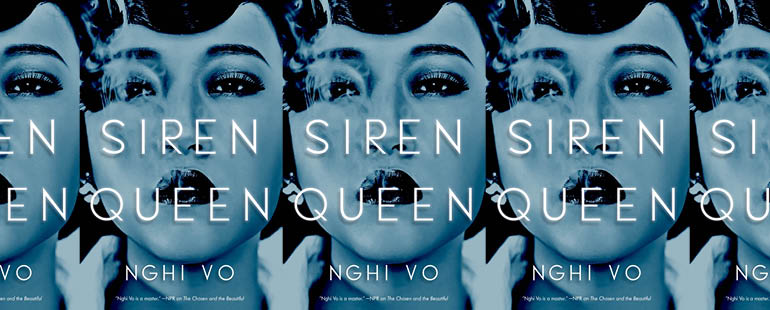Siren Queen’s Subversion of Allegory

Filmmaking has always lent itself to allegory. Something about the layers of celebrity, craft, secrets, and sleaze encourages creators to strip them back, probe the ugliness beneath, and see what they can make that ugliness stand in for—consuming ambition, corrupting power, and hundreds of other variations on similar themes. Think of the word “Hollywood,” itself bristling with allegorical possibilities. When I think of Hollywood, it isn’t the neighborhood in California I’m envisioning, but something much more elusive, threaded through with decades of pop culture associations and metonymy.
Nghi Vo’s 2022 novel Siren Queen enters this sea of symbolic possibilities cynical not only towards Hollywood history, but also its allegorical potential. Growing up in her parents’ laundry on Hungarian Hill, Chinese American preteen Luli Wei cultivates a talent for acting and decides to battle for her place among the stars. That her Hollywood is full of Lovecraftian studio executives and blood sacrifices, and that the star-making is quite literal (on her first visit to Wolfe Studios she sees an actress transcended, overtaken by an “incandescent glow”), only intensifies the sense that a grander message is at work below the surface. But it soon becomes clear that Vo is uninterested in the moral messages of allegory.
Allegory isn’t always known for its nuance. For every multilayered epic like the Divine Comedy, there’s a The Pilgrim’s Progress, which, for all its literary and importance, is far from subtle. The danger of this kind of rigid symbolism is that it narrows the parameters of what and who can be considered virtuous, which has far-reaching moral implications that go beyond a boring reading experience. It’s this rigidity that Siren Queen questions, challenging the assumption that readers can make idea value judgements based on an individual’s experience in an inherently corrupt system.
The pitfalls of this kind of allegory are demonstrated early in the novel. When Luli begins working as an extra, her father’s simmering resentment explodes into violence. In order to shield Luli and her sister, their mother creates enchanted stand-ins, “a pair of quiet dolls instead of…terrified girls.” Although the dolls distract her father, Luli is wary of them, sensing that they are “angry” if she “disturb[s] the peace of the house.” “There was a perfect version of myself flitting around the corner,” she says, “avoiding the rooms where I was because, apparently, she didn’t like the real me either.” As well-intentioned as her mother is, confronting Luli with a lifeless copy of herself pushes her farther away.
The dolls show the suffocating effect of a worldview like her father’s, without room for the desires or flaws of anyone but himself—a worldview very like didactic allegory. Further alienating Luli from her family is another rite of passage freighted with symbolic meaning: choosing a stage name. After securing a meeting with studio head Oberlin Wolfe, she barters her way to a contract, but is stopped short when Wolfe demands a stage name. Panicking as he rejects her suggestions, she blurts out her younger sister’s name, Luli. The character readers have known as Luli Wei is not Luli at all. Her birth name is never revealed, and as soon as Wolfe accepts her sister’s, she knows that “the graft was so brutally quick and thorough it had made ghosts of us.” Names have power, and by stealing her sister’s, Luli enters Hollywood through an act of betrayal.
This attention to Luli’s decision-making and culpability is how Siren Queen develops its strongest critique of allegory’s moral imperative. By exploring the circumstances that prompt her choices, and how inextricably her race, gender, and sexuality affect the roads open to her, Vo builds the case that casting a wide-ranging verdict of good or bad on Luli is impossible. She cannot be the sole embodiment of pragmatic ambition chewed up and spat out by a soulless system, because that system houses too many stories. Flattening any one of them to an archetype obscures the factors that shape the characters.
The other stories the novel delves into further demonstrate that the paths people choose are governed more by circumstance and opportunity than conventional morality. Luli’s roommate Greta is kidnapped and forced into a studio contract because of her supernatural boyfriend. When she falls in love and becomes pregnant, she rescues her boyfriend, who’s about to be sacrificed to Hell by Wolfe Studios. In order to protect him and their unborn baby, she makes a deal with Oberlin to mutilate herself so neither the studio nor anyone else can profit from her beauty again. It’s a one-sided trade for the safety that should be hers by right, and it’s also the only option open to her.
As Luli becomes further entangled in a web of studio double-crossing and danger, the question of why she doesn’t leave like Greta is answered simply: she doesn’t want to. When her mentor, actor Harry Long, flees the studio by sacrificing himself to a Santa Ana wildfire, her reaction is that “death in the Santa Ana fires was something that happened to the migrant workers, to the unlucky, to the foolish, not to us.” In an earlier conversation with Harry, he tells Luli that even though she will have to work for “a tenth of what other girls as talented as you will be given” she “could be a magnificent monster, if you don’t forget that, after all, you are a monster.” The monster he’s referring to is the titular Siren Queen, villain of a series of monster movies the two star in together. It’s also Luli as a Chinese American woman in a largely white industry dominated by men, and Luli as a predator who will do whatever she must to crawl up the food chain. Death or exile are as far from her purview as knowingly walking into a blazing wildfire.
Her monstrous qualities drive Luli, and make a sacrifice like Greta’s or Harry’s impossible for her. In the world of the novel, to want something as deeply as she does is not as simple as an individual moral choice. Webs of blood magic, bonds, and promises tie her to the studio, implicating her and the people she cares about so deeply that a clean break is a fantasy. Her friends’ breaks are both prolonged and painful, and are paths to observe rather than examples to emulate. Readers can decide that walking away from the studio is the objectively moral choice, but that would be a willful misreading of Siren Queen’s insistence on the complexity of human choice and desire when it meets social and biological circumstance.
And so it’s in defiance of simplistic morality that Siren Queen concludes, choosing instead to give Luli her hard-won celebrity even if it’s not an unqualified happy ending. When she becomes a star like the girl she saw on first entering the studio years ago, it’s in front of enemies, ex-lovers, and rivals—a reminder that they are all “as much a worshiper” at the altar of filmmaking as Luli is. Her fame is bound up in the system that exploited her, just as the novel’s allegory is bound up in ambiguity, its rich symbolism determined to remain nebulous. Allegory typically points toward a moral absolute, but Vo’s vision is more tentative: there may be a higher good to strive for, but fully comprehending it is beyond the grasp of most beings—even the stars.



